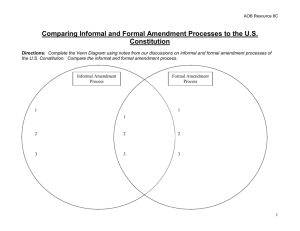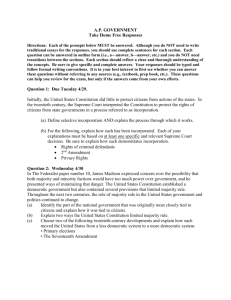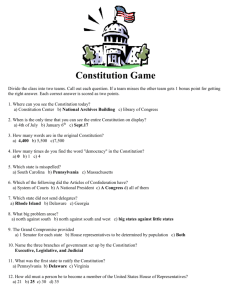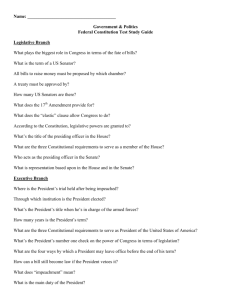Informal Amendment - Jenks Public Schools
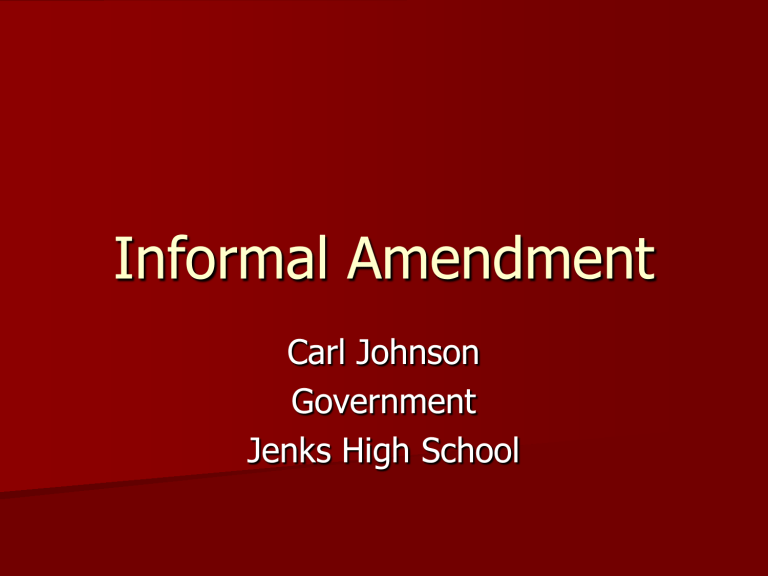
Informal Amendment
Carl Johnson
Government
Jenks High School
Informal Amendment to the
Constitution
Our Constitution is brief and skeletal in nature…
The real key to constitutional change and development has been in informal amendment
– The process by which many changes have been made in the Constitution that have not led to changes in the document’s written words
They are the results of the day-to-day, year-to-year experiences of government under the Constitution
Five Methods of
Informal Amendment
Passage of basic legislation by Congress
Actions taken by the President
Decisions of the Supreme Court
Activities of Political Parties
Customs
Basic Legislation
Congress has been a major agent of informal amendment in two ways
– First, it has passed many laws to spell out several of the
Constitution’s brief provisions
The Judiciary Act of 1789 set up the federal court system
Congress has also created many of the departments, agencies and offices in the Executive Branch
Second, Congress has added to the Constitution by the way in which it uses its powers
Congress has power to regulate foreign and interstate commerce…(Article I Section 8 Clause 3)
The Constitution doesn’t have all those answers, but the many laws under the Commerce clause does
Actions of the President
The manner in which different Presidents have used their powers has also produced many important informal amendments
– Example 1
The Constitution states that only Congress can declare war (Article I Section 8 Clause 11), but according to the Constitution, the President is the
Commander-in Chief (Article II Section 2 Clause 1)
– Many times throughout history, the President has declared war without Congressional approval (over 200+ times)
Court Decisions
The nation’s courts, especially the Supreme Court interpret and apply the Constitution in all of the cases they hear
One example of informal amendment would be
Marbury v. Madison (1803)
Woodrow Wilson once described the Supreme Court as
“a constitutional convention in continuous session”
Party Practices
Throughout our history, political parties have been a big source of informal amendment
However, the Constitution makes no mention of political parties
– Washington in his Farewell Address warned against the divisive effects of political parties
Political parties have been a major player in the shaping of government in this country
Party Practices
– The Constitution does not provide for the nomination of Presidential candidates
But since 1830, the major parties have held national conventions to nominate Presidential candidates
– Both houses of Congress are organized and conducted much of their business on the basis of party
The President makes appointments according to party loyalty
Customs
Unwritten customs may be as strong as written laws and there have been many customs that have developed in our government
– 3 examples
The heads of the 14 executive departments make up the President’s Cabinet
On the eight occasions when the President has died in office, the Vice President succeeded to that office, most recently in 1963
– In 1967, the 25 th amendment was adopted
Customs
For almost 150 years, the “no third term tradition” was closely followed in presidential politics
– Established by George Washington, it was broken by Franklin D. Roosevelt in 1940
– In 1951, the 22 nd amendment was adopted


